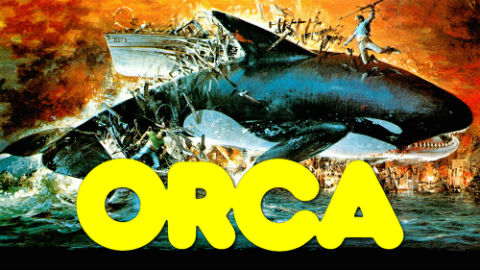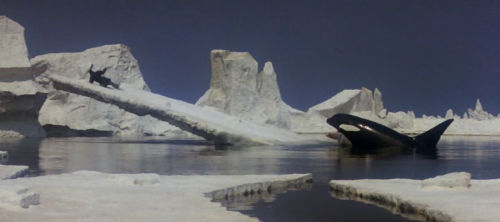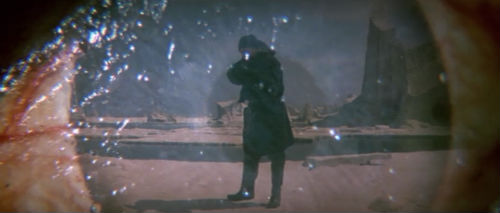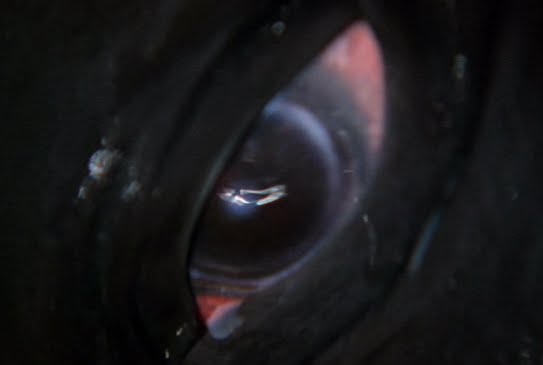Posted on October 27, 2016
Death Wish For Killer Whales
So I hadn’t seen Orca (1977) since it was on HBO sometime in the early to mid 80s. Even then I didn’t recall much of the plot (besides the obvious.) The only scene I really remembered is when the main character is trapped on the floating iceberg at the end, and the whale tilts it, sending the man sliding down it to his inevitable death.
I decided to revisit the film given that it was produced by Italian film producer Dino De Laurentiis (who also produced Death Wish) and directed by Michael Anderson, who had just previously directed one of my favorite films, Logan’s Run. Anderson would also later direct the eerily watchable TV miniseries adaptation of The Martian Chronicles in 1980, which I also enjoyed. Given this, I went into watching Orca probably with higher expectations than most people would when they sit down to view a 70’s horror movie about a killer whale that attacks people.
I’ll spare you the suspense, and just tell you up front that this movie is not good. I was prepared going into re-seeing this film to possibly write about how it was much better than I remembered it, maybe even better than Jaws and an underappreciated classic…but it just isn’t any of those things. It is interesting though, which is partially what makes it so difficult to watch, because one can’t help but be dismayed by all the wasted potential (including a cast which boasts of such highly respected names as Richard Harris and Charlotte Rampling.) Charlotte you might recall was in the news recently when she was attacked by SJWs for stating the obvious about the lack of “diversity” at the 2016 Oscars .
The opening sequences and first 10-15 minutes or so are just beautiful, featuring an award winning musical score and leaving you with the impression you’re diving into a real artistic masterpiece. Unfortunately, it’s pretty much downhill (way downhill) from there until the last 5 minutes of the movie when it gets good again. In fact, if you cut about an hour and a half out of Orca , and just made a film out of the first 15 minutes and the last 5, you’d have a damned good movie.
The plot is actually very similar to Death Wish, only this time it’s the killer whale who is the vigilante seeking revenge for the death of his wife and child, whom were killed by a careless and emotionally troubled fisherman. The fisherman having lost his own wife and child in a car accident with a drunk driver, feels guilt as well as empathy for the whale. He wishes he could communicate how sorry he is, but the killer whale apparently isn’t interested in apologies and terrorizes him, his crew and the entire town out of vengeance. Orca is based on the novel of the same name (which I haven’t read,) by Arthur Herzog.
Since killer whales are highly intelligent, conceptually the plot isn’t all that implausible on the surface. It’s not a stretch to believe that the creature could harbor complex emotions and be able to carry out elaborate revenge scenarios. At least it’s more believable than a great white shark doing these things, like in the awful Jaws the Revenge (which was probably a ripoff of Orca come to think of it.) Cinematically, Orca actually reminds me a lot of Tentacles, an Italian horror film which also came out in 1977 featuring another great musical score and preposterous plot (this time with a giant Octopus terrorizing a beach community and a couple of friendly killer whales teaming up with man as the heroes who save the day.)
The problem with Orca though is that pushes the whale’s vengeance plot way past any point of believability, to the point of absurdity. If they had just kept it reasonable to where it was simply the story of an intelligent whale that was upset over the loss of its family and neurotically began attacking local people and seeking retribution on the fishing boat crew he recognized as being the culprits, it could have worked and been profound. However, what actually happens is the whale terrorizes the fisherman and the town with such precision and specificity that it just makes the whole premise (which was already implausible) utterly ridiculous. For example, the whale angrily sinks every boat in the harbor, except the fisherman responsible, supposedly to torment him and to indicate he wants to have a showdown with the man out at sea. The local townspeople and everyone seems to just know that’s what the whale wants. They presume to know what the whale is thinking. The whale even somehow knows what house the fisherman and his crew live in and he comes by and knocks it into the water. The film even contains the stereotypical wise and spiritually connected Indian/native man, there to instruct the fisherman what he must do. I suppose in 1977, the prophetic and mysterious Indian character may not have been a tired cliché yet. At a certain point in the film I gave up and no longer felt any sympathy for or connection to the characters. The movie becomes so outlandish and unreal that I just kind of detached from the story…almost.
“If he [the orca] is like a human, what he wants isn’t necessarily what he should have.” -Rachel
The ending though, is interesting. When Captain Nolan’s (the fisherman) wife and child were killed by the drunk driver, he just got really depressed. He didn’t really take any action. Because the whale is actively seeking revenge and on a grand scale, the Captain concludes that the whale loved his family more than the fisherman loved his own. Much like many humans, the whale ends up seeking a punishing revenge that’s excessive for what the crime against him warranted, while the captain wrongly assumed he and the whale might come to some kind of understanding and make peace. He hesitates when he has a clear chance to shoot the whale near the end. The compassionate gesture doesn’t appear to phase the whale, which proceeds to kill him mercilessly anyway.
The film ends with the orca swimming beneath the thick arctic ice, unable to surface. Having swam out too far in committing his last act of revenge against the fisherman, the whale himself seems unlikely to survive the ordeal. Some have interpreted this as the whale possibly committing suicide. Perhaps though it’s illustrative of how when righteous vengeance is taken too far, it can wind up consuming and destroying oneself. The whale stubbornly insisted on getting more revenge than he was owed and paid the price.
Captain Nolan: Can you commit a sin against an animal?
Priest: Why, you can commit a sin against a blade of grass. Sins are really against oneself.
The plot device is ironically relatable to the film itself, which overextends its whale revenge premise such that it strains the capacity of viewers to take any part of Orca seriously as a movie. If it accomplishes one thing though, it’s that it makes us think about how we treat these creatures, not because they might hate us and become bloodthirsty murderous maniacs if we’re mean to them (they probably won’t…even when we deserve it,) but because they’re worthy of more respect and compassion than we tend to give them.




